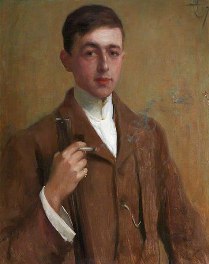View entry
Name: MILLER, Louis Montant (Capt.)

Nee: bro of Agatha Christie
Birth Date: 23 June 1880 Morriston, New Jersey, USA
Death Date: 20 Sep 1929 Marseilles, buried in military cemetery there
First Date: 1907 (Sept)
Profession: Farmer, ivory hunter
Book Reference: SE, Land, Gazette, Law, LG, Rhino Link vol 2, no 19, Oct 2013
War Service: East African units
School: Harrow
General Information:
As a youth, Monty enjoyed sailing a one-man boat, and also played cricket. He was enthusiastic enough about wood-working to set up a workshop at Ashfield. He had a dog named Scottie, and also kept white mice. He was educated in England, initially by a governess who spoke French, and later spent three years at Harrow 1894-1896. While he was a good practical engineer and musician, he struggled scholastically, especially over mathematics. In his teens, his parents withdrew him from Harrow and later found a position for him working in the office of a shipyard on the Dart River; this was a common practice amongst middle-class families at the time.
When the Boer War broke out, Monty was determined to contribute. In June 1900, he was naturalized as a British citizen in Ealing (a London suburb, where his paternal step-grandmother, Margaret West Miller--who was also his maternal great-aunt--lived), and that same month was commissioned as a second lieutenant in the 3rd (Militia) Battalion of The Welsh Regiment. Whilst serving in South Africa a year later, he received a commission as a second lieutenant in The East Surrey Regiment, and was stationed in India for an extended period. In January 1904, he was promoted to first lieutenant, backdated to October 1903. He resigned from the East Surreys in February 1907. He next sought to earn a living in the British East Africa Protectorate, and is known to have worked as a professional hunter. Circa 1911, there was some trouble regarding elephant ivory illegally taken and stored with natives. The conviction was reversed on appeal in November 1912, and there does not seem to have been a retrial. His next project was the idea of running a cargo boat on Lake Victoria. He raised money in England and began building the Batenga in an Essex shipyard. Unfortunately, by the time the boat was completed, WWI had broken out, and the Batenga was appropriated by the War Department. Monty returned to Africa and in October 1914 accepted a commission as lieutenant in the East Africa Transport Corps, later promoted to captain. (His sister said he was in the King's African Rifles, which is possible. Many British military service records from WWI were pulped during WWII, Monty’s among them; this makes it difficult to verify details provided in Agatha Christie's An Autobiography.) Late in the war he was wounded in the arm, which became severely infected and permanently compromised his health.
After the Armistice, he worked for a safari service at a place called Mospi, reached via Tanga, Tanzania. But his health deteriorated alarmingly, and he returned to England in early 1922 for medical treatment. For a while, he lived with his mother at Ashfield; later, his family assisted him in making a more settled home of his own at Crossways, Throwleigh, Dartmoor. He recovered sufficiently to buy a motorcycle, and was registered to vote there 1928-1929.
Circa 1929, he and his housekeeper relocated to the milder climate of the French Mediterranean coast. Unfortunately, soon after their arrival, the housekeeper died, and Monty himself was hospitalized. He rallied sufficiently to move to a residence in Marseille, looked after by a nurse. But that September, he died in the British Hospital, Marseille, from a stroke, and was buried at the military cemetery at Mazargues. (The Christie Archive Trust still possesses the title deed to his grave site.)
